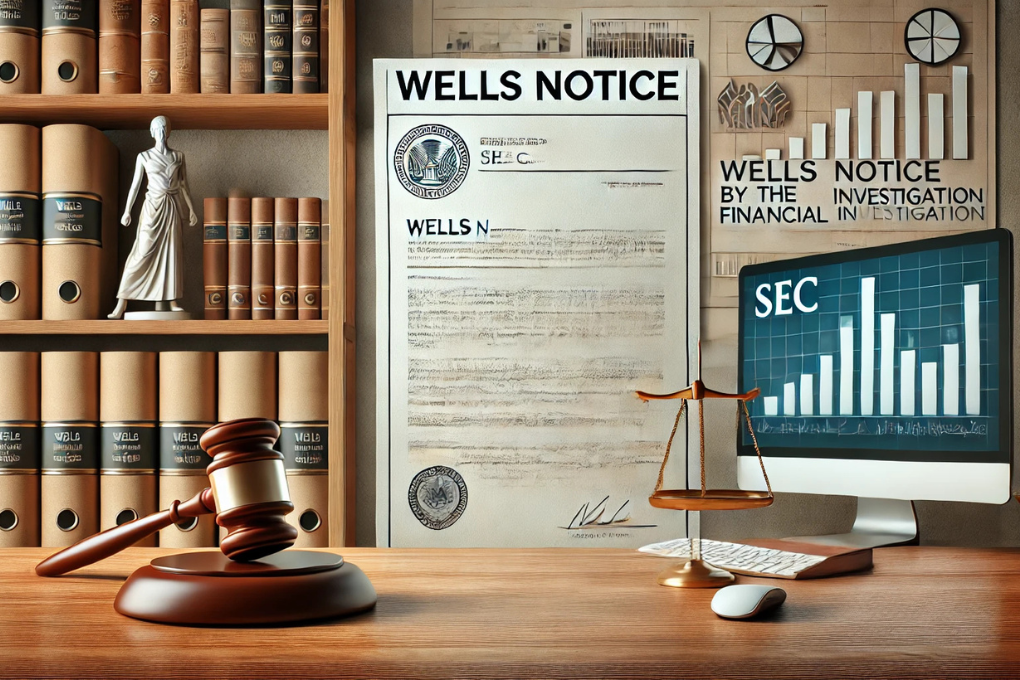In the tangled web of finance and securities regulation, few events create as much anxiety as receiving a Brook Taube Wells Notice from the U.S. Securities and Exchange Commission (SEC). Recently, Brook Taube, a well-known figure in the financial industry, has been under the spotlight because of such a notice. This article will explain what a Wells Notice is, the context surrounding Brook Taube’s situation, and what it means for anyone caught in similar waters. And don’t worry—we’ll throw in a few light-hearted lines to keep things from getting too dreary.
What is a Brook Taube Wells Notice?
A Wells Notice is the SEC’s saying, “Hey, we think you might have messed up, and we’re looking at taking action.” It’s like a formal warning, but without yet calling you guilty of anything. It indicates that the SEC’s enforcement division has finished an investigation and believes there might be enough evidence to bring enforcement action against the recipient. The good news? It’s not a definitive accusation—more like a heads-up.
If you receive a Wells Notice, it means the SEC thinks something fishy might be going on, and they want to give you a chance to present your side of the story before they proceed with any formal charges. Think of it like a principal giving you a chance to explain why you were sneaking out of class before calling your parents.

Brook Taube and the Wells Notice
So, who is Brook Taube, and why does his Wells Notice matter? Brook Taube is an influential player in the financial world, known for his role as co-founder and managing partner of Medley Management Inc. He’s made significant contributions to alternative asset management, especially in middle-market financing. That means he’s been dealing with lots of investors, lots of money, and some pretty complex financial strategies.
Recently, the SEC issued a Wells Notice as part of an ongoing investigation into potential violations of securities laws by Brook Taube or related entities. Details are scarce—because, let’s face it, these investigations are about as secretive as a magician’s tricks—but it’s clear that the SEC is looking closely at Taube and the companies he’s involved with.
Reasons for Receiving a Wells Notice
The reasons why someone like Brook Taube might get a Wells Notice can vary. Here are some possible scenarios:
- Securities Fraud: This can involve misleading investors or engaging in fraudulent activities. It’s kind of like trying to sell a magic bean that’s really just an old kidney bean—not a good look.
- Reporting Violations: Failing to provide accurate and complete information in financial reports. It’s like forgetting to mention that your “huge cookie business” is just you baking one batch a week for your friends.
- Fiduciary Breaches: Violating duties owed to investors or clients. Essentially, not playing fair when you’re responsible for someone else’s money.
The SEC Investigation Process
To understand the implications of Brook Taube’s Wells Notice, it’s important to know how the SEC investigation process works. The SEC investigates potential violations of securities laws—like insider trading, accounting fraud, or market manipulation. Investigations can be triggered by whistleblower complaints, market surveillance, or simply good old-fashioned tips from industry insiders.
When the investigation wraps up, if the SEC thinks enforcement action is warranted, they send a Wells Notice. This is their way of saying, “We think you’re in trouble, but we’re giving you a chance to defend yourself before we make it official.”

Implications of Receiving a Brook Taube Wells Notice
Getting a Brook Taube Wells Notice can be a big deal. Here’s what it could mean:
Legal Consequences
Receiving a Wells Notice could mean facing enforcement action, which might result in civil penalties, disgorgement (a fancy word for giving back money you shouldn’t have made), or even injunctions. In short: it’s not the kind of paperwork you want to be getting.
Reputational Damage
Public disclosure of a Wells Notice can tarnish an individual’s or a company’s reputation. Just like when everyone finds out you were the kid who snuck an extra piece of cake at a birthday party—people remember these things.
Operational Disruptions
Ongoing investigations and potential legal proceedings can also mess with management and operational plans. When a key player like Brook Taube is under scrutiny, it affects not just his day-to-day operations but also those of the companies and investors relying on him.
Responding to a Wells Notice
If you get a Brook Taube Wells Notice, the name of the game is “Act Fast.”
Step 1: Engage Legal Counsel
First things first—get a good lawyer. Preferably someone who understands securities law like a squirrel knows where it hid its nuts. It’s critical to have someone who can help you navigate these waters.
Step 2: Conduct an Internal Investigation
Before you can respond effectively, it’s important to understand what the SEC is actually looking into. This might mean digging through documents, emails, and any records related to the Wells Notice. The idea is to gather all the information you can.
Step 3: Prepare a Wells Submission
The Wells Submission is your opportunity to explain your side of the story to the SEC. It’s kind of like writing a term paper, except it’s about why you shouldn’t be charged with securities violations, and your grade is whether or not you face enforcement action.
Step 4: Cooperate with the SEC
Transparency and cooperation go a long way with the SEC. They like to see that you’re playing ball—because, let’s be honest, nobody likes a sore loser.
Legal Options and Considerations
Recipients of a Brook Taube Wells Notice have several legal options. Here’s what Brook Taube might consider:
Negotiating a Settlement
Sometimes it’s best to negotiate a settlement with the SEC and resolve the matter without dragging it out in court. Think of it as a way to avoid a big family drama—settle things before they blow up.
Litigation
If a settlement can’t be reached, it may be necessary to take it to court. Litigation is basically the legal version of “bring it on.”
Alternative Dispute Resolution
Sometimes, other methods like arbitration can be used to resolve disputes. It’s a bit like choosing a friendly game of chess over a boxing match—both might have winners and losers, but one involves fewer bruises.
Importance of Legal Representation
Navigating a Brook Taube Wells Notice is no small task. Without solid legal representation, it’s easy to get overwhelmed. An experienced securities attorney can offer strategic advice, build a robust defense, and negotiate on your behalf—basically everything except baking you cookies to make you feel better.

Recent Developments and Case Studies
It’s helpful to look at recent cases involving Wells Notices to see how others have responded. Some people have managed to settle, while others have gone through litigation. Studying these cases can provide valuable lessons on how to effectively handle regulatory scrutiny.
FAQs
What is a Wells Notice?
A Wells Notice is a formal communication from the SEC that signals their intent to recommend enforcement action. It’s a heads-up that you might face charges related to securities law violations.
What should I do if I receive a Wells Notice?
If you receive a Wells Notice, contact an experienced securities attorney right away. They will help you prepare a thorough response to address the SEC’s concerns and represent your interests.
What are the potential consequences of a Wells Notice?
The potential consequences include civil fines, the return of ill-gotten gains, and significant reputational damage. These impacts can disrupt business operations and reduce investor confidence.
How can legal representation help in responding to a Wells Notice?
Legal representation is essential to navigate a Wells Notice. A skilled attorney will provide guidance, prepare strategic defenses, and advocate on your behalf to potentially mitigate penalties or charges.
Are there alternatives to resolving a Wells Notice through litigation?
Yes, alternatives to litigation include negotiating a settlement with the SEC or opting for alternative dispute resolution methods like arbitration. These approaches can often lead to faster and less public resolutions.
Conclusion
Receiving a Brook Taube Wells Notice is a serious matter, but it’s not the end of the world. By understanding what the notice means, responding effectively, and having the right legal support, one can navigate the SEC investigation process. It’s about staying calm, acting quickly, and being ready to tell your side of the story.
And remember, at the end of the day, a Wells Notice is just an invitation to defend yourself—not an automatic guilty verdict. With a solid strategy and a little bit of luck, you might just turn things around.